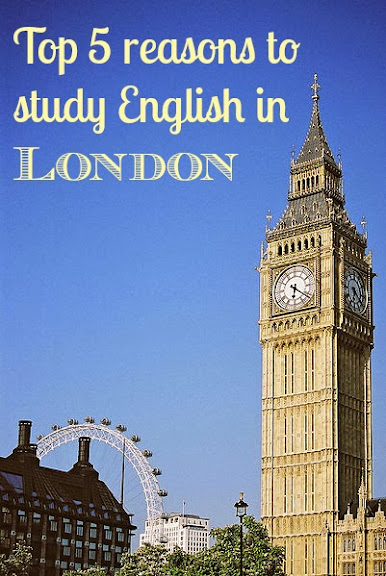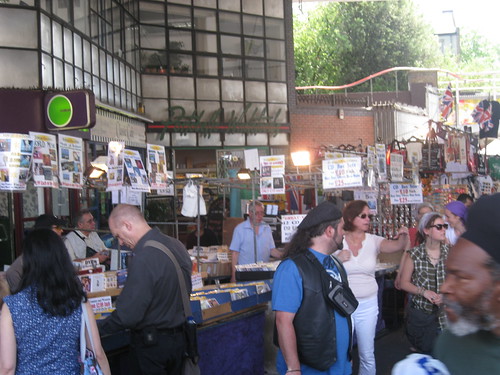Top 5 reasons to study English in London
If you’re thinking about learning English and want to know where the best place to study is, there is one simple answer, London! The UK’s capital city is full of opportunities and excitement, and it is a really good place to pick up the language. In this article you can read about the top 5 reasons to learn English in London, and how you can use your newly acquired skills in each setting.

Wikimedia Commons: Misterzee, adapted by Wandering Educators
Cracking art galleries and museums
London is full of popular art galleries and museums. Visit places like the National Gallery, Tate Britain, and Tate Modern to see some of the finest artwork in the world. As well as art museums, you should also visit the world famous Science Museum and the Natural History Museum. Galleries and museums often have audio tours, which give you a great opportunity to brush up on your listening skills.

Photo courtesy of flickr creative commons: masochismtango
You’ll never get bored exploring London
London is an ancient city with a fascinating history, much of which can still be seen today if you know where to look. There is something to do in every corner of the city, so when you’re not studying on your London English course, get out there and explore. This is your chance to learn how to read the tube maps and bus timetables, and perhaps more importantly, improve your English skills by asking for directions. You can also improve your conversational skills by asking for people’s suggestions of places to go. You will never get a better opportunity to learn the language than by speaking English in London with real Londoners.
The shopping!
If you love shopping, you will love London! Famous streets like Oxford Street and Bond Street are full of designer stores and the best high street outlets, ideal for a day of retail therapy. You can practise your general English skills in the shops, but if you want to take it that little bit further, head for a market. Try visiting Portobello Road Market and Camden Market to barter with stall owners, which is a great way of interacting with real Londoners and boosting your confidence.

Photo courtesy of flickr creative commons: london-attractions-guide
Excellent language schools
London has plenty of highly-rated universities and language schools. The beauty of studying in London is that you get to immerse yourself in the culture and learn English first-hand from the locals whilst also benefitting from expert tuition such as that provided on the UIC London courses.
The multicultural population
The population of London is incredibly diverse. This means that you won’t be the only one who isn’t speaking English, and it gives you plenty of opportunity to practice with those who are also learning. Make sure you speak to Londoners, and who knows, by the time you leave you might even be speaking cockney rhyming slang!




















curtissmith003
Remember, Americans and Brits have different takes on the English language. This often confuses non-native English speakers.
Winston Churchill once quipped, “Two nations divided by a common language.” Just so you know:
A “fag” is a cigarette. I was asked if I wanted to share a fag outside by a male teacher colleague at the college where I was teaching. I was not sure how to respond at first. Either way, the answer was no.
A “rubber” is an eraser. I was asked by a male student if they could borrow a rubber. I thought, borrow? Again, I said no.
A “boot” is a car trunk. Hence, they have boot sales, where everyone drives to a field or parking lot on Saturday morning and sells wares from the boot of their cars. So, if you see a boot sale sign, they do not mean shoes.
A “bonnet” is the hood of the car.
Traffic lights are red, green, and amber (not yellow).
To “let” means to rent, as in you let a flat (apartment in the city).
A “banger” is a sausage. A typical British meal is bangers and mash (sausage and mashed potatoes).
A “loo” is a toilet.
To grow a “beaver” is to grow a beard. You thought we were talking large aquatic rodents.
A “biscuit” is a cookie. Our biscuit is called a roll.
A “crisp” is a potato chip while a “chip” is a French fry.
The first floor is on the second level. Confused? Brits have ground level and then the first floor.
When something is “duff” it is of poor quality. I wonder if that is why Homer Simpson drinks Duff Beer?
“Jelly” is jello.
A “knob” is a penis. Do not ask to turn someone’s knob for them.
“Pecker” is to keep your spirits or courage up, not to be confused with your knob.
Someone who is “pissed” is drunk not angry.
To stand in “queue” is to wait in line.
If you are called a “sod” this is not a compliment. You are an unpleasant person.
“Sort” means to figure things out, not put things in alphabetical or color groups.
If someones asks for a “spanner, then they want a wrench.
To gain a “stone” means you gained 14 pounds. Over the holiday season I gained half a stone (ie. 7 pounds)!
A “torch” is a flashlight.
A “trolley” is a cart with wheels.
The “trunk” is the primary road in the area. This should not be confused with a boot, which is our trunk. So a car with a boot can travel on a trunk.
The “underground” is the famous London subway, which literally is underground.
The “wing” of a car is the fender, so cars have boots and wings, but no trunks because you drive on those.
“Zed” is the letter Z.
The number zero (0) is called “naught,” as in 200 is ‘two-naught-naught.”
Don’t forget, at a “zebra crossing” do not wait and look for African striped horses. It is where you cross the street on the painted white and black striped lines.
Lastly, a “full-stop” is the period at the end of a sentence.
There are MANY more terms to learn. Pronunciation and spelling of British versus American English words differ sometimes too. In general, everything that ends in “or” in American English ends in “our” in British English. For example, color is spelled colour in England. I highly recommend reading Notes from a Small Island by Bill Bryson before you go. It is a little dated, but still fairly accurate and very witty, full stop.
Remember, the British way is the right way, at least according to them. They will remind you of this continually. So pecker up mate!